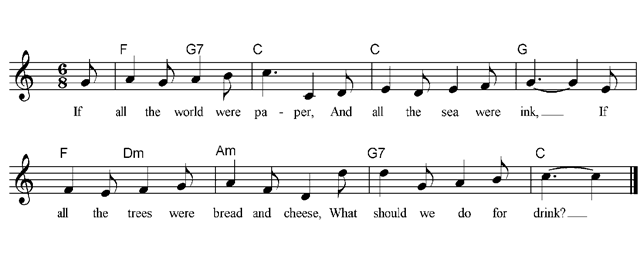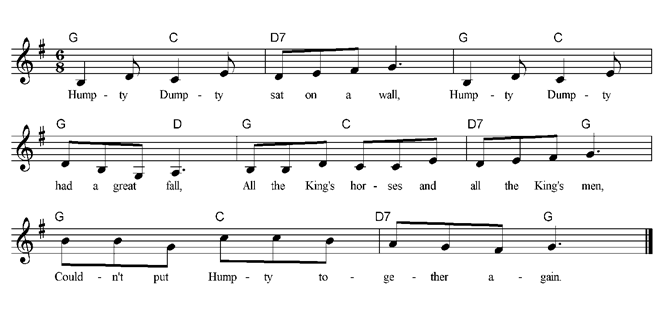Just
nursery rhymes A-I
All in the dumps
Alphabet song, forwards and
backwards
Baa baa black sheep
Cackle, cackle, Mother Goose
Cocks crow in the morning
Cock-a-doodle-doo!
Ding dong bell
Four
and twenty tailors
Georgie
Porgie
Girls
and boys come out to play
Goosey,
goosey gander
Hey
diddle diddle
Higglety
pigglety, pop!
Humpty
Dumpty
I had
a little hen
I had
a little nut tree
I
love little pussy
If
all the world were paper
Last updated: 1/23/2023
10:55 AM
These
songs are nursery rhymes and other traditional songs compiled, illustrated and
music arranged by Dany Rosevear.
Return to the ‘Singing games for children’ home page
![]() To listen to music from these
songs click on 🔊
To listen to music from these
songs click on 🔊
To watch the
author sing a song click on the title at:
© Dany Rosevear 2013 All rights reserved
You
are free to copy, distribute, display and perform these works under the
following conditions:
·
you must give the original author credit
·
you may not use this work for commercial purposes
·
for any re-use or distribution, you must make clear to others the
licence terms of this work
·
any of these can be waived if you get permission from the copyright
holder
Your
fair use and other rights are no way affected by the above.
|
All in the dumps 🔊 A London nursery rhyme. We’ve all been ‘under the weather’ at times and this song expresses it
well! Having been poorly over the Christmas season, ‘shingle bells’, but
still being able to pick up the guitar and make music has cheered me up
immensely. Also here the dark nights are upon us and the heating keeps breaking
down so this nursery rhyme had particular appeal but for my own sanity I need
an optimistic end piece! This traditional rhyme can
be found in ‘The Nursery rhymes of England’ (1845) edited by James Orchard
Halliwell but was around some time before that. Music (in 4/4 and 3/4 time) and second verse by Dany Rosevear. |

|
We’re all in the dumps, For diamonds are trumps; The kittens are gone to St
Paul’s! The babies are bit, The moon’s in a fit, And the houses are built
without walls. Oh, what shall we do? Oh, what shall we do? We will take up our
fiddles, Sing, “Hey, diddle
diddle!” And put on our dancing
shoes! Yes, we’ll take up our
fiddles, Sing, “Hey, diddle
diddle!” And put on our dancing
shoes! |
|
Alphabet song, forwards and backwards 🔊 A fun challenge for those that can recite their alphabet easily! This
version rhymes too. |

|
A, B, C, D, E, F, G, H, I, J, K, L, M, N, O, P, Q, R, S, T, U, V, W, X, Y and Z; Now I know my ABC, Next time sing it
backwards with me. Z, Y, X, W, V, U, T, S, R, Q, P, O, N, M, L, K, J, I, H, G, F, E, D, C, B, A. Now I know my Z, Y, X’es, Bet that’s not what you
expected! |
|
The meaning of this most
popular of nursery rhymes is lost in the mists of time but is probably to do
with wool taxes that persisted into the 15th century. To find out
more visit: http://en.wikipedia.org/wiki/Baa,_Baa,_Black_Sheep
The song became
controversial in the 1980s when it was linked to the slave trade but there is
no historical evidence to support such a connection– indeed the wool from the
black wool is highly sort after as it did not need to be dyed.
|
|
Cackle, cackle, Mother Goose 🔊 A nursery rhyme featuring a
well-known character. ‘Mother Goose’ is the embodiment of nursery rhyme
collections and is sometimes illustrated as an old lady with a black pointed
hat (a witch) riding on a goose; the common link being they both have a
tendency to cackle. Set to music by Dany Rosevear. |

|
Cackle,
cackle, Mother Goose, Have you
any feathers loose? Truly have
I, pretty fellow, Half enough
to fill a pillow, Here are
quills, take one or two, And down to
make a bed for you. |
|
Cock-a-doodle-doo! O This nursery rhyme dates
from around 1760s. To find out more visit http://en.wikipedia.org/wiki/Cock_a_doodle_doo
|
|
Cocks crow in the morning 🔊 An adaptation
of the classic nursery rhyme. How I love the freshness of the early morning
air and empty pavements on the the way to the swimming pool before the bustle
of the rush hour in our little city. Night owl or
morning lark, there are advantages to being either. Wealthy here probably
referred to riches but wealthy in time and other ways could be offered as a
motive to rise early / as an alternative. Set to a
French tune by Dany Rosevear. |

|
Cocks crow
in the morning To tell us
it’s time to rise, For those
who lie late Will never
be wise; For early
to bed And early
to rise, Is the way
to be healthy, Wealthy and
so wise, so wise, Is the way
to be healthy, Wealthy and
so wise. |
|
Ding dong bell O A very old nursery rhyme.
|
|
Four-and-twenty tailors 🔊 This is one of several rhymes that can be found in Beatrix Potter’s
‘The tailor of Gloucester’ It is a shortened version of a much older rhyme
According to Peter and Iona Opie ‘Kyloe’ cows have long horns and are a
lesser known breed of Scottish Highland cattle. The tune comes from ‘Little
songs of long ago’ by Alfred Moffat published 1912. |

|
Four-and-twenty tailors Went to catch a snail; The best man amongst them Durst not touch her tail. She put out her horns Like a little Kyloe cow; Run, tailors, run! Or she'll chase you all
e'en now! |
|
Georgie Porgie O This rhyme was formally
collected in the mid 19th century however its origins are thought
to be much older and theories abound; to find out more visit: http://en.wikipedia.org/wiki/Georgie_Porgie
Roud number 19532
|
|
Girls
and boys come out to play O A cheerful
nursery rhyme that dates back to at least 1708 when children worked during
daylight hours and played in the evening before bedtime. |

|
Girls
and boys, come out to play, The moon
doth shine as bright as day; Leave
your supper, and leave your sleep, And come
with your playfellows into the street. Come
with a whoop and come with a call, And come
with a good will or not at all. Up the
ladder and down the wall, A
ha’penny loaf will serve us all. You find milk, and I'll find
flour, And we'll have a pudding in half
an hour. |
|
This rhyme was first
published in 1784. I have always ended the
rhyme with the less familiar last two couplets but do not know where this
version originated. To find out more about this
rhyme visit: http://en.wikipedia.org/wiki/Goosey_Goosey_Gander
|
|
Hey diddle diddle O This is the version I sang
as a child.
|
|
Higglety, pigglety, pop! 🔊 A cheerful
nursery rhyme from 1846 when it was written by Samuel Goodrich who beleived
nursery rhymes were nonsense and that anyone could write them; and so he did,
not intending that it should become popular. This could be used as a
knee bouncing rhyme or a word play rhyming game where the dog eats simple
three letter objects: Higglety, pigglety, pat! The dog has eaten the mat… |

|
Higglety,
pigglety, pop! The dog
has eaten the mop; The
pig’s in a hurry, The
cat’s in a flurry, Higglety,
pigglety, pop! |
|
Humpty Dumpty O For all babies who have just
learnt to sit.
|
|
I had a little hen 🔊 Together spring
cleaning and baking. A song based on
the classic nursery rhyme ‘I had a little hen’ with an emphasis on
co-operation, being helpful and friendship. Adapted words
and music by Dany Rosevear inspired by the ‘Barney’ version of the song. Note
the past and present tense in each verse. |

|
I had a
little hen, The best
you’ve ever seen, We helped
each other To keep
things nice and clean. We went to
the mill To fetch
some fine brown flour, We brought
it home In less
than ½
an hour. Just like
that little hen, The kindest
ever seen, We help
each other To keep our
houses clean. We bake
bread and cake, And brew a
pot of tea, Good
friends together Chatting
happily! |
|
I had a little nut tree O This nursery rhyme was first
published 1789. To find out more visit http://en.wikipedia.org/wiki/I_Had_a_Little_Nut_Tree
and http://www.rhymes.org.uk/a35-i-had-a-little-nut-tree.htm
|
|
I love little pussy O This nursery rhyme was first
published 1830. It has a Roud number 12824. To find out more visit: http://en.wikipedia.org/wiki/I_Love_Little_Pussy
|
|
A nursery
rhyme that has a thinking that can be traced back to the Old Testament. Find
out more at: https://treasuryislands.wordpress.com/2012/10/03/origins-if-all-the-world-were-paper/ |

|
If all
the world were paper, And all
the sea were ink, If all the
trees were bread and cheese, What
should we do for drink? If
friars had no bald pates, Nor nuns
had no dark cloisters, If all
the seas were beans and peas, What
should we do for oysters? If there
had been no projects, Nor none
that did great wrongs, If
fiddlers shall turn players all, What
should we do for songs? If all
things were eternal, And
nothing their end bringing, If this
should be, then how should we Here
make an end of singing? |
Return to the ‘Singing games for children’ home page











